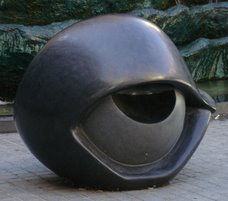“For me, the strength of photography lies in its ability to evoke humanity. If war is an attempt to negate humanity then photography can be perceived as the opposite of war.”
This 90-minute documentary about the work of war photographer James Nachtwey communicates best in the visual realm – and it’s interesting to see that the interview footage reveals Nachtwey as a man who speaks few, carefully chosen words. While he skillfully shares his insights and sets the context for his photos from Kosovo, Indonesia, Rwanda, and Palestine, it is clear that he is most at home using the camera lens to tell the stories that surround him.
The images are stunning, horrifying, beautiful, and full of emotion – be that of fear, anger, sorrow, or hope. And the documentary video footage of Nachtwey in these locations speaks the same if only at a faster pace.
The only negative to the DVD version that I rented (through Netfix) was that the English subtitles wouldn’t kick in during the foreign language segments.
28 February 2007
27 February 2007
Gandhi
“Whenever I despair, I remember that the way of truth and love has always won. There may be tyrants and murderers, and for a time, they may seem invincible, but in the end, they always fail. Think of it: always.”
What an amazing film – beautifully acted, scripted, and directed with bold and compelling visuals. So many thoughtful, moving scenes but my favorite has to be when Gandhi and his wife entreat the people to break free of their desire for English-made cloth as it has ruined the local farmers and factories and contributed to the enslavement of the Indian population by the British. In response, the crowds create enormous bonfires in which they destroy the foreign made cloth.
Do you think there will ever come a day when Americans, en masse, break free of the shackles of foreign oil dependence and instead rely on “home-spun” (as Gandhi referred to locally produced cloth) solutions?
Gandhi touched the lives of 3.5 million people and compelled them to embrace his message of peaceful resistance (if only for a short time). As history has shown many times, the difficulty is not in uniting many factions against a dictatorial power, but in breaking the cycle of oppression inherent in subsequent ruling parties.
The message is just as important now as it was back then – maybe even more so.
What an amazing film – beautifully acted, scripted, and directed with bold and compelling visuals. So many thoughtful, moving scenes but my favorite has to be when Gandhi and his wife entreat the people to break free of their desire for English-made cloth as it has ruined the local farmers and factories and contributed to the enslavement of the Indian population by the British. In response, the crowds create enormous bonfires in which they destroy the foreign made cloth.
Do you think there will ever come a day when Americans, en masse, break free of the shackles of foreign oil dependence and instead rely on “home-spun” (as Gandhi referred to locally produced cloth) solutions?
Gandhi touched the lives of 3.5 million people and compelled them to embrace his message of peaceful resistance (if only for a short time). As history has shown many times, the difficulty is not in uniting many factions against a dictatorial power, but in breaking the cycle of oppression inherent in subsequent ruling parties.
The message is just as important now as it was back then – maybe even more so.
26 February 2007
A Sunday at the Pool in Kigali
There is a weight that the reader must carry with them through the 260 pages of Courtemanche's story and that is the knowledge of how this story will end. Yes, there is graphic violence, sex, and detailed descriptions of the physical manifestations of AIDS. The author also paints some disturbing insights of those suffering under extreme oppression, discrimination, and poverty and the general ambivalence of those who have been appointed (or anointed) to save them.
As in real life (and this story, while considered fiction, is really non-fiction) a few characters are truly evil, a few truly good, but most are somewhere in between - struggling with their day-to-day decisions in the midst of a horrifying and chaotic environment. Many readers in the US may become frustrated or even angry with the seemingly foolish decisions that Canadian journalist Valcourt and his Rwandan wife, Gentille make. However, it would be wise to remember that many of us in the west have never had to experience such extreme conditions in our home communities. Would you so quickly give up your history, possessions, and family in the face of injustice? Or would you stay with the hope that truth and justice ultimately prevails? That dilemma is what creates the underlying tension in Courtemanche's story and all readers could benefit from the thoughts and emotions it provokes.
As in real life (and this story, while considered fiction, is really non-fiction) a few characters are truly evil, a few truly good, but most are somewhere in between - struggling with their day-to-day decisions in the midst of a horrifying and chaotic environment. Many readers in the US may become frustrated or even angry with the seemingly foolish decisions that Canadian journalist Valcourt and his Rwandan wife, Gentille make. However, it would be wise to remember that many of us in the west have never had to experience such extreme conditions in our home communities. Would you so quickly give up your history, possessions, and family in the face of injustice? Or would you stay with the hope that truth and justice ultimately prevails? That dilemma is what creates the underlying tension in Courtemanche's story and all readers could benefit from the thoughts and emotions it provokes.
Subscribe to:
Posts (Atom)
